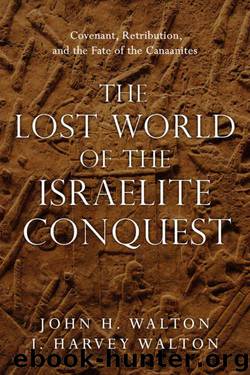The Lost World of the Israelite Conquest: Covenant, Retribution, and the Fate of the Canaanites by John H. Walton & J. Harvey Walton

Author:John H. Walton & J. Harvey Walton [Walton, John H.]
Language: eng
Format: epub
Publisher: InterVarsity Press
Published: 2017-08-06T16:00:00+00:00
COVENANT, CHAOS, AND THE FATE OF THE ISRAELITES
If the conquest is a recapitulation of creation, then the exile is a recapitulation of the flood. The flood is a reversal of creation, not a repetition of it; the cosmic waters are released and wipe out creation, restoring the cosmos to its nonordered, precreation state.25 Similarly, the exile is a reversal of the conquest; God’s presence departs from the temple (Ezek 10), and the nations (the thematic representations of chaos) crash in and wipe out the people of the covenant (the thematic representations of the created order), except for the faithful remnant who are preserved. The essential difference between the cosmic waters in Genesis 1 and antediluvian humanity in Genesis 6 is their inherent relationship to the cosmic order, and this difference also exists between the Canaanites at the conquest and the Israelites at the exile. The Canaanites and the cosmic waters have no relationship with cosmic order at all. They exist outside it and are indifferent to it, and so when order is established they are brushed aside with neither malice nor regret. But Israel and antediluvian humanity are part of their respective constructions of order; they were established in the order to conserve it, and by living within it they enjoy its benefits. Failure to conserve the order brings a consequence of its destruction. The flood undid the created order with the return of the cosmic waters; the exile undid the covenant order with the loss of Israel’s land, leadership, temple, and everything that had defined the identity of its community.26
The offense described by Sargon’s imprecation, and also committed by both preexilic Israel and antediluvian humanity, is a corruption or perversion of an existing established order; this is the essence of what we call sin.27 Chaos, on the other hand, is merely the absence of order; it cannot pervert or corrupt order because it has no order to corrupt. Agents of nonorder literally cannot sin and therefore cannot ever be said to be punished for sin; this is why, as discussed in propositions five and thirteen, the Canaanites, in accordance with their depiction as agents of nonorder, are frequently accused of rāʿâ (badness) and tôʿēbâ (behavior outside the bounds of order) but never ḥāṭāʾâ, which is sin: the twisting, bending, perverting, distorting, or corrupting of order. Only agents of order are capable of sin and therefore able to be punished for sin.28
Of course, this does not mean that the actual historical people of Canaan were incapable of sin because they were outside the covenant. Sodom (accused of sin in Gen 13:13) was outside the covenant too (see also the argument of Rom 5:13-19), but the conquest account is not a technical theological treatise on how sin works (what systematic theologians call hamartiology). The historical people of Canaan were not actually subhuman chaos monsters any more than they were actually incestuous bestiophiles. The purpose of the conquest narrative is not to describe the literal nature of the literal people but to
Download
This site does not store any files on its server. We only index and link to content provided by other sites. Please contact the content providers to delete copyright contents if any and email us, we'll remove relevant links or contents immediately.
The Five People You Meet in Heaven by Mitch Albom(2841)
Name Book, The: Over 10,000 Names--Their Meanings, Origins, and Spiritual Significance by Astoria Dorothy(2490)
Real Sex by Lauren F. Winner(2474)
The Holy Spirit by Billy Graham(2417)
The Secret Power of Speaking God's Word by Joyce Meyer(2253)
0041152001443424520 .pdf by Unknown(2220)
How The Mind Works by Steven Pinker(2213)
Ancient Worlds by Michael Scott(2102)
ESV Study Bible by Crossway(2094)
The Meaning of the Library by unknow(2068)
The Gnostic Gospels by Pagels Elaine(2026)
Churchill by Paul Johnson(2012)
MOSES THE EGYPTIAN by Jan Assmann(1971)
The ESV Study Bible by Crossway Bibles(1911)
Jesus by Paul Johnson(1887)
The Nativity by Geza Vermes(1849)
Ancient Near Eastern Thought and the Old Testament by John H. Walton(1846)
The Complete Dead Sea Scrolls in English (7th Edition) (Penguin Classics) by Geza Vermes(1840)
City of Stairs by Robert Jackson Bennett(1826)
